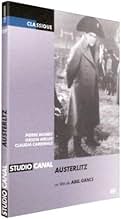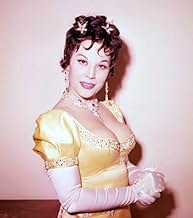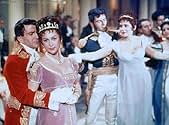AVALIAÇÃO DA IMDb
6,2/10
1,1 mil
SUA AVALIAÇÃO
Mais uma das aventuras de Napoleão nesta épica reconstrução da batalha de Austerlitz, onde teve a maior vitória de sua carreira, sobre os russos.Mais uma das aventuras de Napoleão nesta épica reconstrução da batalha de Austerlitz, onde teve a maior vitória de sua carreira, sobre os russos.Mais uma das aventuras de Napoleão nesta épica reconstrução da batalha de Austerlitz, onde teve a maior vitória de sua carreira, sobre os russos.
- Direção
- Roteiristas
- Artistas
- Prêmios
- 1 indicação no total
- Direção
- Roteiristas
- Elenco e equipe completos
- Produção, bilheteria e muito mais no IMDbPro
Avaliações em destaque
I believe the reason after so many votes that no one has decided to offer a review of this film is because it appears so hard to define it as a film. This is much more a tedious, detailed account of Napoleon's victory at the battle of Austerlitz. The film focuses so much on the strategic underpinnings of the battle that is almost seems more like watching a risk or stratego game than a film. From the political maneuvering of how the French and Russian forces came to the battle to the strategic genius that was Napoleon this film does not offer much in the way of character development, acting, or even special effects. What the film does offer is a historical recount of how battles were fought in the early 19th century. The only interesting cinematic points of interest is to look for a young Jack Palance as a Russian General and a scene stealing Orson Welles as an American inventor. Also this was one of the last films directed by the French "DW Griffith" - Abel Gance.
This is two different movies stuck together. In the first part Napoleon is introduced in a very informal way, showing him debating hats with his personal valet. For a moment I thought it was going to be a comedy... Then the plot takes a more serious turn, with Napoleon in Paris, undecided about seizing power and proclaiming himself emperor. I watched the original French version, which includes several scenes in English, showing the British plotting against Napoleon and the events leading to the execution of the duke d'Enghien.
Still in Paris we are shown Napoleon's greedy family and mistress, and his coronation (luckily only narrated) and then the story finally marches (literally) toward the battle of Austerlitz. Several scenes show the Russians and the Austrians preparing for war and debating in French, as the only common language and then the battle itself, which is a long and slightly boring series of scenes lasting over one hour, with a bit of battle, then Napoleon talking strategies with his generals, more battle, strategies discussed by Russians and Austrians and again battle and Napoleon.
Napoleon won this one, considered as his greatest success and Gance wraps up the movie on a patriotic and chauvinist note, with the Marseilles blasting on screen.
Despite the sumptuous costumes and the many stellar cameos, the film is uneven in tone and contains some weird scenes: the opening with Pierre Mondy as a peevish Napoleon is bizarre as is the scene with Napoleon in a bathtub discussing with his ministers; Napoleon encounters with his lover are superfluous as is the meeting with Robert Fulton (played nonetheless by Orson Welles in a useless cameo); the coronation narrated to the servants with the help of puppets is beyond bizarre and even the battle drags on forever, without an apex.
Still in Paris we are shown Napoleon's greedy family and mistress, and his coronation (luckily only narrated) and then the story finally marches (literally) toward the battle of Austerlitz. Several scenes show the Russians and the Austrians preparing for war and debating in French, as the only common language and then the battle itself, which is a long and slightly boring series of scenes lasting over one hour, with a bit of battle, then Napoleon talking strategies with his generals, more battle, strategies discussed by Russians and Austrians and again battle and Napoleon.
Napoleon won this one, considered as his greatest success and Gance wraps up the movie on a patriotic and chauvinist note, with the Marseilles blasting on screen.
Despite the sumptuous costumes and the many stellar cameos, the film is uneven in tone and contains some weird scenes: the opening with Pierre Mondy as a peevish Napoleon is bizarre as is the scene with Napoleon in a bathtub discussing with his ministers; Napoleon encounters with his lover are superfluous as is the meeting with Robert Fulton (played nonetheless by Orson Welles in a useless cameo); the coronation narrated to the servants with the help of puppets is beyond bizarre and even the battle drags on forever, without an apex.
This movie is a huge disappointment. You'd expect the battle of Austerlitz to be the core subject as the title suggests, but it's not. Most of the movie is about the Napoleonic era before the battle, with a pseudo historic perspective. If you know just a little about history, you'll find yourself yawning most of the time, as Abel Gance tries to describe the situation for hours, through endless dialogs. Then when Napoleon is about to be crowned, you think: oh no, not another half hour just for that scene. Fortunately there's no coronation scene, but.. worse: it's told! You guess correctly: Gance didn't have the budget to do it. He might as well just skipped the whole episode.
By then you've waited more than 2 hours and still no battle in sight. At last the battle comes but what you see is a tragic waste. The tactics and whereabouts of the battle are not shown but told, and you can hardly understand what's going on. A cavalry charges from right to left (a couple hundred horses), and you assume it's the Austrian cavalry. Then you're told that they're defeated by the French, and you see the same guys charging from left to right (they don't even seem to have switched costumes). Parts of the battle were filmed in studio, with ridiculous painted backgrounds. The close combat scenes are unrealistic at best. Soldiers fall apparently for no reason, and if nobody told you about the outcome, you wouldn't know who won or lost. The last scene with the French Army singing the national anthem completes the cinematographic disaster.
All in all, you sit back with the feeling that this movie was conceived and shot in the early days of movie making, not in 1960: it's not a movie about Austerlitz, it's the pathetic attempt of an aging man trying to describe the glory of an emperor he admired. The result is a boring picture that doesn't even enhance our historic understanding of the Napoleon era (in spite of Gance's attempts to stick to some historic details).
By then you've waited more than 2 hours and still no battle in sight. At last the battle comes but what you see is a tragic waste. The tactics and whereabouts of the battle are not shown but told, and you can hardly understand what's going on. A cavalry charges from right to left (a couple hundred horses), and you assume it's the Austrian cavalry. Then you're told that they're defeated by the French, and you see the same guys charging from left to right (they don't even seem to have switched costumes). Parts of the battle were filmed in studio, with ridiculous painted backgrounds. The close combat scenes are unrealistic at best. Soldiers fall apparently for no reason, and if nobody told you about the outcome, you wouldn't know who won or lost. The last scene with the French Army singing the national anthem completes the cinematographic disaster.
All in all, you sit back with the feeling that this movie was conceived and shot in the early days of movie making, not in 1960: it's not a movie about Austerlitz, it's the pathetic attempt of an aging man trying to describe the glory of an emperor he admired. The result is a boring picture that doesn't even enhance our historic understanding of the Napoleon era (in spite of Gance's attempts to stick to some historic details).
I was under the impression for ages that Abel Gance only made one Napoleon film (all the way back in 1927), and that he wanted to make five or six, but never got the chance. It turns out this isn't entirely true. Not only is Napoleon (1927) long enough to be two or three films in one (it's like 5.5 hours long), but Gance got to make a sort-of sequel in 1960, with the also epic-length The Battle of Austerlitz.
This 1960 film is about half the length of Napoleon, but that still puts it at approximately 170 minutes. It also feels like two movies in one, with a lot of political drama being the focus of the first half, and then the second half centering on planning for the titular battle alongside showing some of it.
I thought the second half would be a good deal more engaging, but I think The Battle of Austerlitz starts quite well, staying pretty engaging for maybe the first half of its first half. Things don't necessarily pick up in a big way once the second half starts, though. It's a bit plodding in different ways to the first half, and it becomes apparent at a point that even the battle parts aren't really going to be about depicting exciting battles. If you come in hoping for something similar to the 1966/67 War and Peace or Waterloo, you'll probably come away disappointed.
The methodical approach to it all (across both halves), while dry, is somewhat admirable. Abel Gance isn't doing nearly as many adventurous things with the camera this time around, which can be disappointing after having watched his 1927 film, but I guess there's sound now, and it's a new approach. The transition from making a silent Napoleon film to making a more traditional one with dialogue was more seamless than I'd been anticipating, and Gance would've had to have been fairly old while making this. I think he did a decent job, all things considered.
Still, this is probably just a curiosity piece for those who were intrigued by and liked Napoleon, or just anyone who's interested in any film about Napoleon Bonaparte. There sure are many of them; I keep coming across new ones all the time, and honestly, I don't think I've seen any I could call flat-out bad yet.
This 1960 film is about half the length of Napoleon, but that still puts it at approximately 170 minutes. It also feels like two movies in one, with a lot of political drama being the focus of the first half, and then the second half centering on planning for the titular battle alongside showing some of it.
I thought the second half would be a good deal more engaging, but I think The Battle of Austerlitz starts quite well, staying pretty engaging for maybe the first half of its first half. Things don't necessarily pick up in a big way once the second half starts, though. It's a bit plodding in different ways to the first half, and it becomes apparent at a point that even the battle parts aren't really going to be about depicting exciting battles. If you come in hoping for something similar to the 1966/67 War and Peace or Waterloo, you'll probably come away disappointed.
The methodical approach to it all (across both halves), while dry, is somewhat admirable. Abel Gance isn't doing nearly as many adventurous things with the camera this time around, which can be disappointing after having watched his 1927 film, but I guess there's sound now, and it's a new approach. The transition from making a silent Napoleon film to making a more traditional one with dialogue was more seamless than I'd been anticipating, and Gance would've had to have been fairly old while making this. I think he did a decent job, all things considered.
Still, this is probably just a curiosity piece for those who were intrigued by and liked Napoleon, or just anyone who's interested in any film about Napoleon Bonaparte. There sure are many of them; I keep coming across new ones all the time, and honestly, I don't think I've seen any I could call flat-out bad yet.
My review of this film can be summed up in five words a brilliant work of art.As described in the previous description the film itself is long and sometimes tedious.What it fails to mention is that it was created by the same Director that brought us the Silent film about Napoleon Abel Gance.The film is in colour and is very faithful to the feel of Napoleon and the time he ruled Europe.It is primarily about the greatest victory Napoleon achieved in his career,however it also touches on many of the events in his life leading up to that moment including his coronation as Emperor of France.If you are a student of Napoleon or French history or this time period you will enjoy this picture.Shot all throughout Europe in the fifties in many languages it remains in my opinion as the greatest picture chronicling Napoleon and his life.The film not only tells a story from his perspective but many others as well.It is difficult to find and even more expensive to own but I definitely recommend you see it at least once for yourself.
Você sabia?
- CuriosidadesIn the 1920s Abel Gance had written a six-part movie biography of Napoleon. He shot the first part (Napoleão (1927)), which turned out to be a financial disaster. He sold the sixth part to Lupu Pick, who shot Napoleon auf St. Helena (1929). Wanting to make a comeback at the end of the 1950s, Gance rewrote the third part to make it "Austerlitz".
- Erros de gravaçãoIn the scene in William Pitt's office in London which is set in the early 1800's, you can see in the background through the window the Houses of Parliament and Big Ben, 60 years before they were built.
- Versões alternativasThe original French version runs longer than the English dubbed international one. It contains extra scenes including ones with Napoleon visiting his mistress and of Ségur (Jean-Louis Trintignant) imagining the coronation of the emperor for the palace staff.
- ConexõesEdited into Histoire(s) du cinéma: Seul le cinéma (1994)
Principais escolhas
Faça login para avaliar e ver a lista de recomendações personalizadas
- How long is The Battle of Austerlitz?Fornecido pela Alexa
Detalhes
- Data de lançamento
- Países de origem
- Idioma
- Também conhecido como
- A Batalha de Austerlitz
- Locações de filme
- Empresas de produção
- Consulte mais créditos da empresa na IMDbPro
Bilheteria
- Orçamento
- US$ 4.000.000 (estimativa)
- Tempo de duração2 horas 46 minutos
- Mixagem de som
- Proporção
- 2.35 : 1
Contribua para esta página
Sugerir uma alteração ou adicionar conteúdo ausente






































